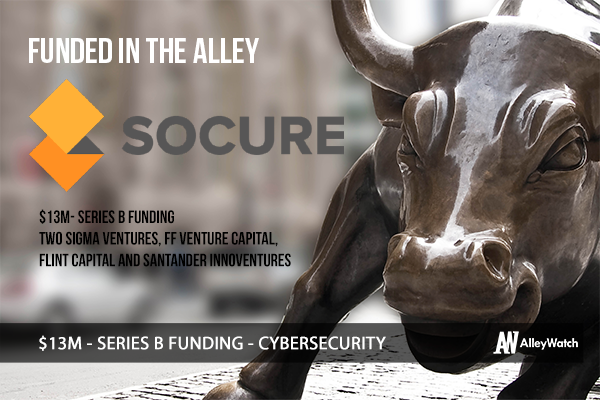With notable individuals and companies being hacked in recent months, cyber safety is on our minds. If you are looking for a strong way to increase your consumers and your own cyber security, Socure is a must know. The company double-checks user information with social information available to make sure the user matches the actual person. If the profiles don’t match Socure targets and blocks any potential fraudulent behavior. You already have so much of your information online and it’s time to start leveraging it to help instead of hurt you.
AlleyWatch spoke with CEO and cofounder Sunil Madhu about the company and its latest round of funding.
Who were your investors and how much did you raise?
We raised our Series B round of $13M in this round from investors Two Sigma Ventures, ff Venture Capital, Flint Capital and Santander InnoVentures.
Tell us about your product or service.
Socure is the leader in digital identity verification. Its technology applies machine-learning techniques with trusted online/offline data intelligence from email, phone, address, IP, social media and the broader Internet to authenticate identities in real-time.
Socure bolsters CIP/KYC programs and AML/OFAC compliance for enterprises in the US, and powers financial inclusion verifying identities in over 180 countries, helping them to combat identity fraud, increase consumer acceptance, and to reduce compliance and manual review costs. Socure was founded in 2012 and is based in New York City.
What inspired you to start the company?
Being a first-generation immigrant, I thought about how hard it was to get credit in the US, even after having an established history in Europe. Having come from an information security and identity background – though multiple start-ups [e.g. Netegrity IPO (NETE) in 2003, Securent $100M exit to Cisco in 2007], I set out to explore the problem further.
Having spent 20+ years in identity and access management and ventured briefly (4 years) into an omnichannel marketing/advertising start–up, it occurred to me that online & social data has potential applications for security and identity verification.
I tapped Johnny Ayers, whom I worked alongside at General Assembly – to co-found Socure and focus on building a scalable business model and partner network, to address the challenge of financial inclusion for millions of people worldwide, using online & social media data.
How is it different?
Most solutions in the space are data brokers, focused on retailers or merchants. Socure took a different approach, focusing instead of the largest financial institutions–banks and credit card issuers for example– that effectively provide the “rails” on which commerce is conducted.
Socure is the only firm that blends online identity data with offline conventional identity to synthesize a complete digital view of a consumer.
What market you are targeting and how big is it?
Socure is solving an acute problem globally. In the US alone, the obtainable market exceeds $11B, as a combination of Fraud Prevention and AML/Compliance in the Governance Risk & Compliance market segment as well as the Authentication segment of the Security market.
What’s your business model?
Socure is a cloud-based software provided as a RESTful API. Organizations prepay annual term agreements with a base of identity verifications on a monthly basis, and then pay by the volume of identities they verify on a monthly basis thereafter.
Does the software ever identify someone as a fraud when it is in fact not?
In the identity verification space, this is called a “false positive”. In the industry it’s not uncommon to have a false positive ratio of 8 or 10 to 1, meaning that for every 1 true fraud that is stopped, 8-10 authentic consumers are rejected or inconvenienced. The ID+ solution for Consumer Verification, which runs atop the Socure Social Biometrics Platform is able to demonstrate false positive rates far lower – on the order of 3:1 or even 2:1.
What was the funding process like?
There were a number of funds that wanted to invest, but their money came with a request we move to the Bay Area. Acknowledging we wanted to remain in NYC, at the heart of the financial industry and where we feel our clients reside, we quickly narrowed to the funds with which we shared a philosophy.
From there, the process was straightforward, as you’d imagine – with due diligence on our business model, finances, and client successes.
What are the biggest challenges that you faced while raising capital?
Market contraction and working in a hard problem space, meant trying to find an educated investor was time consuming. In fact, we met with 150 funds–from SF to Boston–while raising our Series A investment.
What factors about your business led your investors to write the check?
Investors like the fact that we are in a hard problem space, our solution is sufficiently differentiated, and the global market opportunity is massive.
What are the milestones you plan to achieve in the next six months?
Converting a large percentage of the 400+ tier-1 and tier-2 financial institutions with whom we have been engaged into paying clients.
What advice can you offer companies in New York that do not have a fresh injection of capital in the bank?
Focus on proof points, traction with clients to show potential investors that you are solving a real problem and establishing a scalable business.
Where do you see the company going now over the near term?
Scaling our business globally, starting with tier-1 financial institutions in the US, then quickly moving to address the problem of global financial inclusion.
Where is your favorite bar in the city for an after work drink?
This is New York! We’re not at a loss for options.




